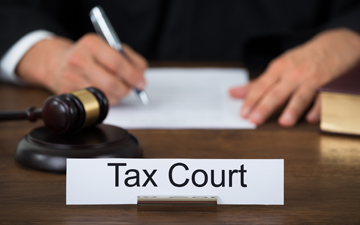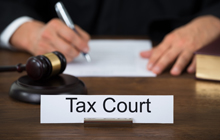Zvilna v. The Queen: Director's liability for unpaid taxes, a note of caution to directors

Tax lawyer and accountant David J. Rotfleisch on the successful appeal of a director’s liability assessment before the Tax Court of Canada
Background on Directors Liability for Taxes
 |
David J Rotfleisch, CPA, JD is the founding tax lawyer of Taxpage.com and Rotfleisch & Samulovitch P.C., a Toronto-based boutique tax law corporate law firm. |
The Tax Court of Canada recently decided a case (Zvilna v. The Queen, May 2022) regarding director's liability for unremitted GST/HST. Generally, a director of a corporation can be held personally liable to CRA for various corporate liabilities such as unremitted GST and HST, as well as unremitted payroll deductions for employees. Corporations have a duty to remit GST/HST as well as the required wage deductions such as CPP/EI and income tax withholdings. However, when a corporation fails to do so, and the corporation does not have the funds to pay the CRA, directors of a corporation can be held personally liable under subsection 227.1(1) of the Income Tax Act.
Often, this occurs when a business is struggling financially. For example, a business owner uses funds that are owed to the CRA in an attempt to save the business. The director and business owner believes that when the business begins to make more money, the corporation will then pay off its CRA tax debts.
For a business owner with limited tax knowledge, funding the business in this manner may seem like an obvious choice. However, the director can be held personally liable for the taxes owing by the Corporation. It is a tax trap to think that merely because business is incorporated, that the owner (who is a director) cannot be held personally liable for these monies. The CRA can collect from the director personally.
Limitation Period for Director Tax Liability
Section 227.1 has several key provisions and defences against the CRA issuing a director's liability assessment. One such defence is the limitation period of two years. Subsection 227.1(4) states that no action can be commenced against a director more than two years after director ceased to be a director of the corporation. Simply, if a director resigns, and two years passes, the CRA is barred from collecting the taxes owing from the director. This is referred to as a "limitation period" because it limits the amount of time the CRA has available to come after the director for these monies.
Zvilna v. Canada [2022] T.C.J. No. 36
The recent Zvilna case enlightens several key aspects of the limitation period for director's liability. The corporation in question, TASAC Ltd., had unremitted taxes and had failed to pay them in the 2009 tax year. The CRA had commenced an action on September 30, 2015 (almost six years later) against the director personally under section 227.1. The key issue was whether Zvilna had resigned as a director more than two years prior to the commencement of the action.
Three underlying arguments were made on behalf of Zvilna concerning the limitation period defence.
First, that Zvilna had verbally resigned from being a director, and had nothing further to do with the business or the directorship of the business. However, a purely verbal resignation is insufficient. This is because the resignation must a be legally valid resignation. A purely verbal resignation is not legally valid because of a key section (121(2)) in the Ontario Business Corporations Act (OBCA) which states that: "A resignation of a director becomes effective at the time a written resignation is received by the corporation or at the time specified in the resignation, whichever is later".
Hence, a verbal resignation does not constitute a resignation for corporate law and therefore for tax purposes.
Second, the taxpayer argued that a future condition resignation is sufficient for a resignation.
However, because further action was required to resign when those conditions were met, it did not on its own constitute a resignation. Hence, a written resignation must be clear and current. If it is a future date, the resignation occurs on that future date.
And third, that a written agreement confirming his resignation as a director was signed and delivered to the other director in 2011. The events in the clause for a future resignation occurred prior to 2011 and the subsequent agreement was signed in 2011, though it was ready to be signed five years prior. Further evidence also pointed to the written resignation being a clear resignation. Hence, because there was a resignation four years prior to the action commencing, the judge agreed with the taxpayer that he could not be held personally liable.
As a result, because the director had resigned in writing four years before the CRA action, the CRA was barred from creating personal liability against the taxpayer.
Editor’s note: The details of Zvilna v. The Queen are worth reading, as the case involves a married couple where the husband and wife were the only directors of the corporation. Their separation agreement included the appellant’s resignation as a director of their company.
David J Rotfleisch, CPA, JD is the founding tax lawyer of Taxpage.com and Rotfleisch & Samulovitch P.C., a Toronto-based boutique tax law corporate law firm and is a Certified Specialist in Taxation Law who has completed the CICA in-depth tax planning course. He appears regularly in print, radio and TV and blogs extensively.
With over 30 years of experience as both a lawyer and chartered professional accountant, he has helped start-up businesses, cryptocurrency traders, resident and non-resident business owners and corporations with their tax planning, with will and estate planning, voluntary disclosures and tax dispute resolution including tax audit representation and tax litigation. Visit www.Taxpage.com and email David at david@taxpage.com. Read the original article on Mondaq. Photo David Rotfleisch courtesy Rotfleisch & Samulovitch P.C.









(0) Comments